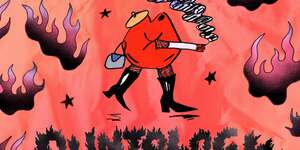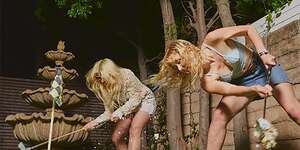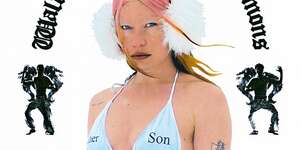|
“You know how Fleetwood Mac almost dedicated Rumours to their cocaine dealer? I think we should dedicate this album to all the booze we bought at Tesco,” laugh Lambrini Girls. The Brighton-based duo of Phoebe Lunny (vocals/guitar) and Lilly Macieira (bass) have spent the last few years on a tear in more ways than one. Making a reputation for themselves as one of the best live bands to come out of the UK this side of Idles, their combination of blunt-force punk, scathing social commentary and barbed humour has garnered comparisons to Bikini Kill and Huggy Bear, and seen them share bills with Gilla Band, Shame, Frank Carter & The Rattlesnakes, Iggy Pop and more. Released in 2023, their critically acclaimed EP You’re Welcome harnesses that live energy into six flamethrower tracks that tackle everything from lad culture to transphobia. Encapsulating their approach in a single image, the cover art features a cartoon pile of shit on fire.
There’s also been a slew of accolades along the way, including a nomination for the Rising Star at the Rolling Stone UK Awards, a Kerrang! cover feature with Sleater-Kinney, and a score of international festival appearances from Glastonbury to Iceland Airwaves. When it came to writing their debut album, then, time wasn’t exactly forthcoming. “We literally had none,” Phoebe laughs. “We’ve been in the arse end of the Netherlands in the back of a van.”
Written in two short bursts in rural Oxford against the clock, their full-length debut Who Let The Dogs Out is a raw distillation of Lambrini Girls’ anger, energy, and charisma. They got the bones of it down in the first session, which saw them lock into a routine of waking up, going for a run, writing until 7PM, then cooking and eating dinner together before going to bed and doing it all over again. The second was arguably more chaotic. “We had something like 48 beers, a bottle of vodka, six bottles of wine, two bottles of Lambrini, rum and tequila…” Phoebe recalls. “During the first session we ran out of booze, which is obviously illegal, so for the second we did a big shop and stocked up. We somehow managed to drink through all of that in a week.”
Despite being a high pressure situation, the combination of Dutch courage and a ticking clock helped play into their strengths. The end result is raw, instinctive, and straight from the gut. “Because we had such little time, I had this switch in my brain that just went ‘I've just got to let these songs be what they want to be’,” Lilly explains. “In the first session it was very much like, ‘no, this has to be really thought out,’ but by the second I was like, ‘I’ve got to let go a little bit, see what comes out and just see it through.’ Trust the process kind of thing. That was a really big part of writing this album. It’s also a big part of why the energy is similar to our live shows, because it’s just how we are.”
Recorded with Gilla Band’s Daniel Fox and mixed by Seth Manchester (Mdou Moctar / Battles / Model/Actriz), Who Let The Dogs Out bottles everything wrong with the modern world and shakes it up. It explodes with “Bad Apple,” which opens with sirens blaring over a heavy distorted bass and a live drum breakbeat. Phoebe delivers a pissed off takedown of the police over the instrumental, breathlessly listing everything that’s wrong with them from institutional violence and racism to Section 8. For the duo, the track “encapsulates a lot of what might be considered Lambrini Girls energy,” and sets the tone for the rest of the album. “It’s angry, it’s observant, and it’s done in a way that doesn’t trivialise the issue,” Phoebe says. “It’s just a big punch in the face,” Lilly agrees.
From there, the album rips through a laundry list of social ills. Lead single “Company Culture” takes a dark, and unfortunately widely relatable, issue like sexual harassment in the workplace and turns it into an accessible punk sing-along with a dirty guitar riff and a head-bopping beat. Skewering the issue with an acid sentiment and tongue-in-cheek lyrics (“Blondes have more fun / In company culture / Pretend that I know how to use a computer”), it gets people through the door for the more politically dicey subject matter – “Bad Apple’s” call to “Hang the pigs / That hunt your daughters,” for instance. The approach is a deliberate one that Lilly likens to “buying people dinner first.”
“Nothing Tastes As Good As It Feels” takes a crass approach to disordered eating (“Nothing tastes as good as it feels / As my head hits the rim of the toilet lid”), riffing on the faux happy image of 2000s thinspo culture by swinging between upbeat pop punk and dirty grunge tones. The breakneck “Big Dick Energy” seethes about “men being equally equal parts dangerous and entitled,” articulating real concerns over women’s safety while delivering irreverent blows to the male ego (“Stop telling me how much you lift!”). Written at the last minute in the studio, closer “Cuntology 101” grabs “cunty” out of the zeitgeist and uses it as a noise-pop cheer for putting yourself first, whether it’s having an autistic meltdown or doing a poo at your mate’s house.
The bass is the melodic and sonic foundation of Lambrini Girls, and Who Let The Dogs Out sees Lilly bring more of her own influences – which range from Gilla Band and Ditz to Brighton DIY bands like CLT DRP – into the mix. “With the EP, I was new to the band. When writing my parts I was more focused on having it be congruent with what the band had already done,” she explains. “I think I allowed myself to infuse this album with a lot more of my personal identity and my influences, which are a lot noisier.” Meanwhile, the album also has more guitar-heavy songs that give Phoebe more room for embellishment.
Both of those forces come together on “Special Different,” a discordant post-punk track that refines their knack for taming noise into something musical. In the lyrics, Phoebe sings about their experience of being neurodivergent – one of a few tracks that balance the album’s political charge with something more personal and inward looking.
“Love” is similarly dark and dynamic. It starts abrasively with Lilly going “bonkers mode” on bass, experimenting with reverb and harmonics, before dipping into a quiet section where Phoebe finger picks a melodic guitar line, and finally erupting in a wall of noise. Coming at the classic “breakup” song from a left field perspective, it cautions against mistaking toxicity for love itself. “Bands sings about break-up – groundbreaking!” Phoebe jokes. “In that sense it’s nothing new, but it is for me. I've never done anything like that before, and I didn't want to do it cheesy. I was like, if you're gonna see about toxic relationships, you need to actually go in a bit. Don't hold back.”
On the other side of the observational coin, “Filthy Rich Nepo Baby” takes aim at classism in the music industry. Rather than being a trite call to “eat the rich,” though, it rugby tackles the subject with humour (“Hugo wants to be a rockstar”). “It’s more about the romanticization of people that I literally know come from old money and have houses on the seafront with five floors. And they dress with elbow patches and holes in their jeans and little fucking baker boy hats, going around like ‘you alright love?’” Phoebe eye-rolls. “It’s about the way that the working class is romanticised by the upper class, because the industry knows that's what sells. That’s the main thing I wanted to write about: class tourists who are sitting on bags of money and acting like they’re not. Their struggles are nothing more than a fashion statement.”
Sandwiched between “Filthy Rich Nepo Babies” and anti-gentrification banger “You’re Not From Round Here” is an interlude featuring clips of speeches by U.S. civil rights activist Kwame Ture and Marxist feminist Angela Davis, both of whom discuss capitalism in the context of race. “I want to see all oppressed people throughout the world free,” Davis’ voice echoes over amp feedback. “We picked those quotes from two historically important people, because they are great role models for their tireless and unapologetic activism - particularly for the civil rights movement - which is much needed still today,” Lilly explains. “We placed it between two songs which are, in different ways, about the evils borne from capitalism, in homage to their work in educating people on capitalism’s role in oppression both in a racial and socio-economic context.”
Landing smack in the middle of the album, it’s a moment of pure sincerity and quiet reflection on what Lambrini Girls are actually about. It only lasts for 17 seconds, mind you, then it’s back to making a racket, but it stands as the activist spine of an album that deftly balances politics and humour with the aim of being accessible to anyone. “If you're trying to get a message across, you want to make what you're singing about reachable to people so they feel like they want to learn more, and aren’t forced to learn more,” Phoebe explains. “If you had a piece of brown bread on a plate and were like, ‘you’ve got to eat this whole thing and it’s going to be really good for you,’ you’d probably think, ‘fuck it, maybe, if I have to…’ but you’re not going to be excited about it. If you give someone a piece of brown bread that’s got icing on it, sprinkles, maybe a sparkler… I’d shove that in my mouth immediately! It's about packaging things in a way that makes them seem a bit more enticing.”
If peppering political songs with humour is like sticking a sparkler in some bread, then Who Let The Dogs Out is like a fireworks display in the factory itself: strange, dangerous, exciting. With instrumentals that inhale you like a Level 5 tornado and sentiments that make you want to kick the nearest door through, it’s a take-no-prisoners debut from one of the UK’s most fun and fearless bands.
|

 LP
LP
 Single
Single
 Single
Single
 Single
Single
 Single
Single
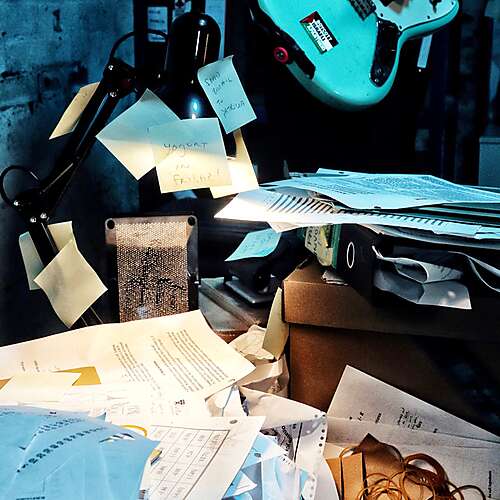 Single
Single
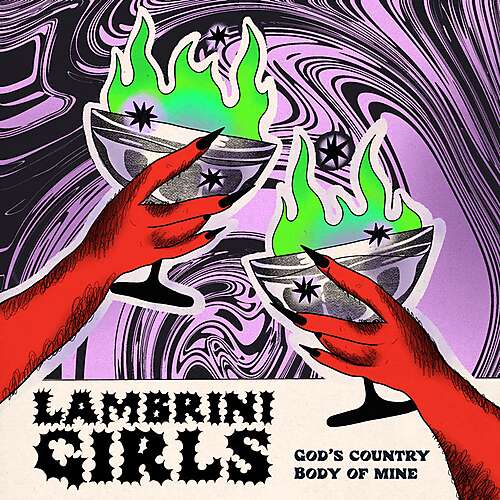 Single
Single


